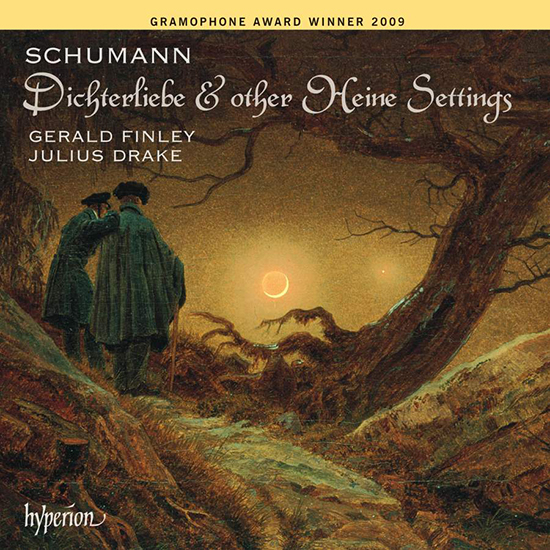Schumann: Dichterliebe and other Heine Settings

Why another Dichterliebe recording? Because Gerald Finley has simply one of the greatest voices of his generation, and is an artist at the peak of his powers. He brings to this noble song cycle the supreme technical ability and penetrating musical understanding that characterize all his performances, whether on the concert platform, in the recording studio or on the great opera stages of the world. This is his fourth disc with collaborator Julius Drake, and the partnership has proved to be a uniquely rewarding one.
This fine recital also includes many of Schumann’s other Heine settings. The extremes of elation and despair in Heine’s poetry stimulated Schumann to write some of his most poignant and unforgettable songs. This is truly a disc to treasure.
Performed with: Julius Drake, piano
Released September 2009
Hyperion
Tracklisting
Schumann: Romanzen und Balladen IV, Op. 64
- IIIa. Tragödie I
- IIIb. Tragödie II
Excerpt,
- I. Die beiden Grenadiere
Excerpt,
- III. Abends am Strand
Excerpt,
- II. Die feindlichen Brüder
Schumann: Romanzen und Balladen III, Op. 53
- IIIa. Der arme Peter I
- IIIb. Der arme Peter II
- IIIc. Der arme Peter III
Schumann: Belsazar, Op. 57
Excerpt,
- VII. Die Lotosblume
- XXI. Was will die einsame Träne?
- XXIV. Du bist wie eine Blume
Excerpt,
- II. Lehn’ deine Wang’ an meine Wang’
Excerpt,
- III. Es leuchtet meine Liebe
- II. Dein Angesicht so lieb und schön
Excerpt,
- IV. Mein Wagen rollet langsam
Schumann: Dichterliebe, Op. 48
- I. Im wunderschönen Monat Mai
- II. Aus meinen Tränen spriessen
- III. Die Rose, die Lilie, die Taube, die Sonne
- IV. Wenn ich in deine Augen seh’
- V. Ich will meine Seele tauchen
- VI. Im Rhein, im heiligen Strome
- VII. Ich grolle nicht
- VIII. Und wüssten’s die Blumen, die kleinen
- IX. Das ist ein Flöten und Geigen
- X. Hör’ ich das Liedchen klingen
- XI. Ein Jüngling liebt ein Mädchen
- XII. Am leuchtenden Sommermorgen
- XIII. Ich hab’ im Traum geweinet
- XIV. Allnächtlich im Traume
- XV. Aus alten Märchen
- XVI. Die alten, bösen Lieder